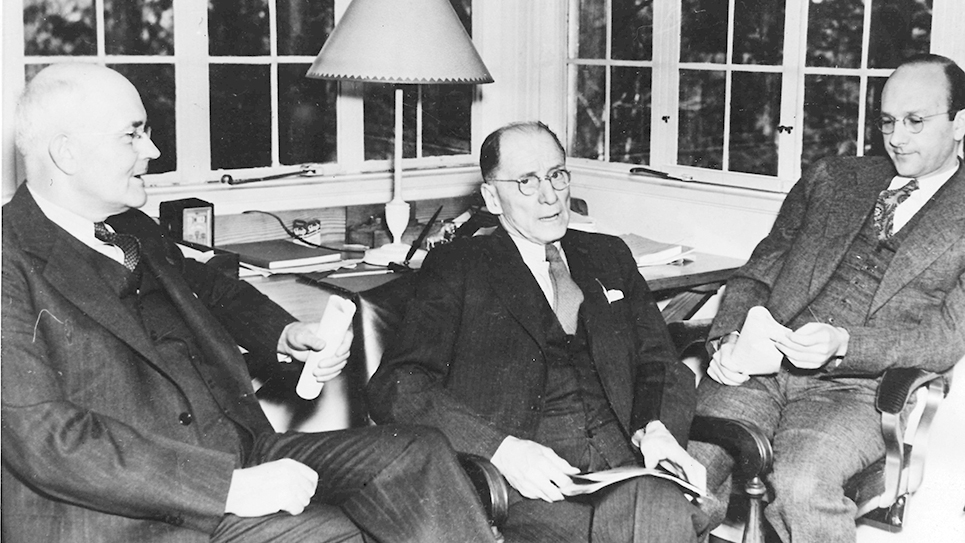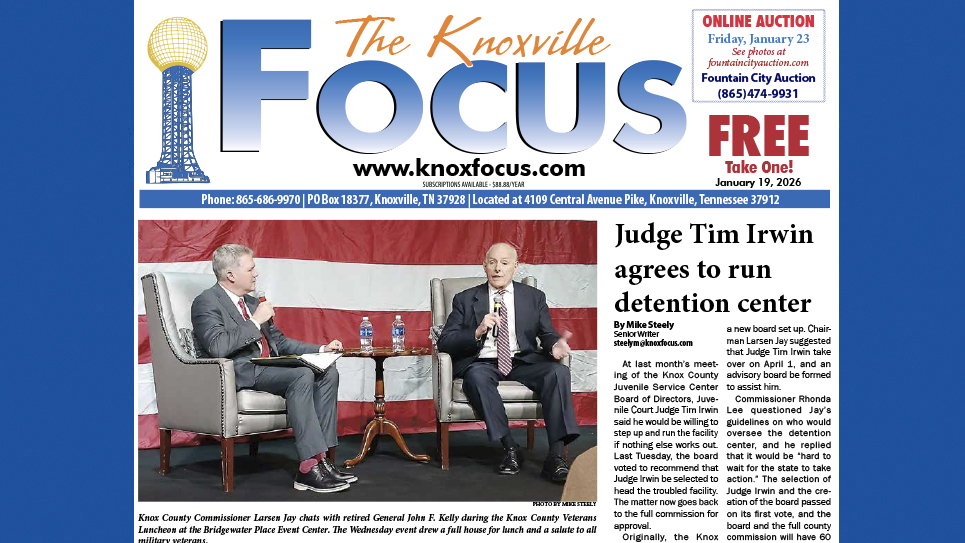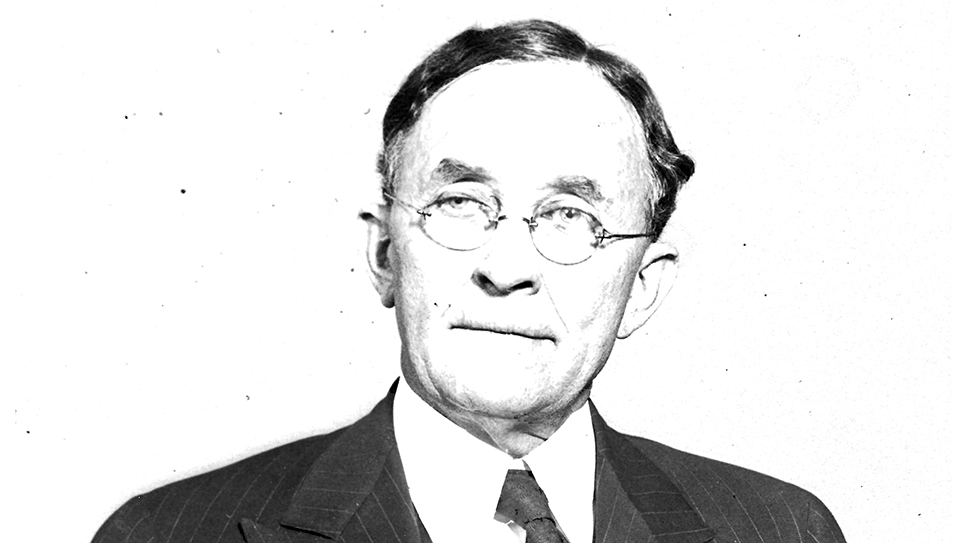James P. Pope of Idaho & Tennessee
By Ray Hill
I doubt very much if any readers recall James Pinckney Pope, but there was a time when his name was quite well known here. Indeed, for 24 years of his life, Jim Pope lived in Knoxville with his wife, Pauline; Jim Pope was one of the more prominent citizens of Knoxville.
Tall, bald on top, and bespectacled, Pope looked more like an affluent accountant than a politician, but he had enjoyed a varied and colorful career. Born in Jonesborough, Louisiana, Jim Pope graduated from what was later Louisiana Tech University in 1906. Degree in hand, Pope left for Chicago where he attended the Chicago School of Law. Taking heed of Horace Greeley’s famous advice, “Go West, young man, and grow up with the country,” Pope took his law degree and moved to Idaho, settling in Boise. Eventually, Pope became the assistant to Boise’s city attorney, and then an assistant attorney general for the State of Idaho. Jim Pope also served as a member of Idaho’s Board of Education. In 1928, Jim Pope was elected mayor of Boise as a Democrat.
In 1932, James P. Pope was the Democratic nominee for the United States Senate to face Republican incumbent John Thomas. Thomas, a wealthy rancher and businessman, was swallowed up in the tidal wave that installed Franklin D. Roosevelt as president of the United States and washed out GOP incumbents in both houses of Congress. Jim Pope won better than 55% of the ballots cast in the general election.
Once inside the Senate, James P. Pope became a stalwart supporter of President Roosevelt and the New Deal. Pope’s loyalty to Roosevelt and the New Deal would become a major issue in his 1938 reelection campaign when he faced a strong challenge inside his own Democratic primary.
Profoundly angry with those Democrats inside the United States Senate who dared to defy him, President Franklin Roosevelt set out to purge those apostates who had refused to back his plan to pack the U.S. Supreme Court. Roosevelt, unquestionably one of the most popular and powerful presidents in American history, experienced his first singular political failure in being unable to dislodge a single senatorial incumbent inside the Democratic primaries.
Senator James P. Pope had the support of the Roosevelt Administration in his primary contest with Congressman D. Worth Clark, who was more conservative. Clark, a staunch opponent of American intervention in foreign wars, beat Senator Pope by just over 3,000 votes, winning the Democratic nomination with almost 52% of the vote. President Roosevelt was both aghast and incensed. Roosevelt, pointing to the supposedly 20,000 Republicans who had voted inside the Democratic primary to support D. Worth Clark, snapped it was “immoral.” The piqued FDR ignored his own support for Independent George W. Norris against a Democratic candidate in Nebraska, as well as other instances of having wandered off the reservation.
Senator James Pope was one of the first fallen incumbents to be taken care of by President Roosevelt. FDR offered Pope a seat on the Tennessee Valley Authority Board of Directors, which the former Idaho senator accepted. That appointment meant Pope would have to move to Knoxville where the TVA was headquartered. On January 12, 1939, President Franklin D. Roosevelt appointed James P. Pope to the TVA Board. Republican Styles Bridges of New Hampshire huffed Roosevelt’s appointment of Pope to the TVA Board of Directors was illegal. Bridges’ logic was somewhat twisted as he contended Roosevelt’s removal of Board Chairman Arthur E. Morgan had been “unwarranted and illegal.” Morgan had made something of a spectacle of himself by making accusations against his colleagues; the conflict had escalated between Morgan and David Lilienthal.
President Roosevelt, who disliked personal confrontations, finally demanded Arthur Morgan substantiate his charges against his fellow board members in general and David Lilienthal in particular. Arthur Morgan either couldn’t or wouldn’t provide proof of his accusations. When Morgan finally refused, FDR fired him.
The objections of Senator Styles Bridges notwithstanding, James P. Pope was easily confirmed by the Senate for a six-year term on TVA’s Board of Directors. Even Bridges was careful to say he had no quarrel with Pope’s nomination personally, but he thought the former Idaho senator’s nomination was “establishing a vicious principle.” Bridges contended the courts would uphold Arthur Morgan’s lawsuit that the board chairman’s removal had been illegal. Bridges, in his tortured logic, said if so, Pope’s appointment would prove to be invalid.
Under the watchful eye of Tennessee’s senior United States Senator Kenneth D. McKellar, the Senate collectively ignored Bridges’ objections and confirmed Pope’s nomination. In fact, the courts did not uphold Arthur Morgan’s contention he had been fired wrongfully. FDR’s “utopian” faded into obscurity. Roosevelt had fired Arthur Morgan for “contumacy,” which is a failure to obey authority.
Besieged by newsmen following his confirmation by his former colleagues in the United States Senate, Pope politely said he didn’t wish to discuss TVA policy or the like until he had traveled to Knoxville to better familiarize himself with the agency’s operations. The former Idaho senator casually mentioned he expected to leave for Knoxville “in a few days.”
The two incumbents on the Tennessee Valley Board of Directors following Arthur Morgan’s ouster were Harcourt A. Morgan and David Lilienthal. Harcourt Morgan said he was pleased the president intended to fill the vacancy caused by Arthur Morgan’s removal and had kind words for Jim Pope. “Senator Pope, a native of the southeast, has had considerable contact with the problems of our program.”
On January 17, 1939, James P. Pope arrived in Knoxville, Tennessee, by train. Dr. Harcourt A. Morgan and a band of TVA officials awaited the arrival of the former senator at the railway station. Dr. Morgan, the newly installed chairman of the TVA Board, welcomed Pope and escorted the former senator to his office on the fourth floor of the New Sprankle Building. Jim Pope occupied the offices that had formerly belonged to Arthur Morgan. Pope had visited many TVA projects when he had been a member of a special committee investigating phosphate sources while in the United States Senate. Pope had come to Knoxville as a member of that same special committee.
“I expect to look over some of the new TVA projects and meet the TVA personnel,” Pope told gathered reporters. The new TVA Director told reporters he had not decided if he would live in Knoxville or Norris. The former senator said he was expecting Mrs. Pope to arrive on Sunday, a few days away. Their two sons, Ross and George, were living their own lives. Ross, 24 years old, was the chief clerk at the Hotel Boise in Idaho, while 19-year-old George was a student at George Washington University.
Not everyone greeted James Pope warmly. Just two days after Senator Pope’s arrival in Knoxville, Elizabeth Dilling followed him into town. Mrs. Dilling was the author of “The Red Network,” a book about Communist infiltration, and made a public appearance at Knoxville’s Lyric Theatre where she spoke “in a staccato, machine-gun fashion” and proceeded to attack the American Civil Liberties Union, the American League for Peace & Democracy, the National Youth Congress, and the American Committee for Aid to the Spanish Government. Mrs. Dilling charged those same organizations were “front organizations” for the Soviet Union. Nor did it bother Mrs. Dilling to name names. The author proceeded to tell her audience Albert Einstein, Supreme Court Justice Louis Brandeis, Secretary of Labor Frances Perkins, and James P. Pope, along with several others, were “willing or unintentional agents of Soviet Russia.” Mrs. Dilling insisted a “small group of radicals” controlled the New Deal and made the accusation Republicans were aiding the Communists. Naturally, after having charged just about everyone, save for herself, with aiding or abetting the Reds, few paid any attention to her accusations.
A few days after his arrival, the first delegation of Knoxville citizens marched to James Pope’s offices to “adopt” him as an official citizen of Knoxville. Among those gathered in Pope’s office were Guy Smith, editor of the Knoxville Journal, along with the vice mayor and Knox County judge, who was the equivalent of the county mayor at the time.
Harcourt Morgan, introducing the delegation of eleven men, told Pope, “Here you have a good cross-section of Knoxville. You have here Democrats, Republicans, businessmen, professional men, public officials, good men, and demagogues. . maybe.” That brought a chorus of laughter from those present.
Vice Mayor Fred Allen stepped forward and told the new TVA Director, “We want to adopt you right now as a citizen of Knoxville. We want you to become a real naturalized East Tennessean. We want to cordially welcome you into our midst.”
The delegation good-naturedly joked with Pope about his family tree, his police record, whether he went to church, his cattle-boat trip to Europe and his Southern home. “While I was in the Senate, a lot of people wrote me about my family tree to see if they were kin to me,” Pope said before pausing to add, “I never did want to find out all about it.”
“That is very nice of you,” Jim Pope replied sincerely. “I appreciate very much your taking time to come up here to welcome me. I want you to feel free at any time to come back to see me about any matter, about anything of a civic nature or in any way I can be of service to you or this community.”
Quite likely, Pope’s ability as a skillful politician enabled him to weave himself gently into the fabric of Knoxville’s business and social life. Pope cheerfully executed those duties that normally befell prominent public men and women. Pope spoke at commencements, dedications and any other occasion where there was a need for a little speech and the shaking of hands.
In 1951, James Pope surprised many of his friends and neighbors when the TVA Director wrote President Harry Truman. Pope wrote that he had served on the TVA Board since January of 1939 “during a period of great activity and development in the Tennessee Valley.” Pope stated, “It is a matter of great satisfaction to me to have had some part in one of the most significant and constructive undertakings in American history.” For anyone familiar with history, especially in East Tennessee, it was not an overstatement by any means.
Pope told President Truman he was not an applicant for reappointment as a member of the TVA Board of Directors. “Since I would reach the statutory age of retirement when only a minor part of the term could be served, I deem it to be in the interest of TVA to make way for the appointment of a younger man who could legally serve the full term of nine years as provided by law.”
Pope had kept a ranch in Idaho and following his retirement from TVA, said he would likely visit the state he had represented in the U.S. Senate. “I shall take it easy for a while,” Pope told a reporter. “I am considerably behind in my fishing.”
Pope continued to live in Knoxville and practiced a little law. Pauline Pope died in 1957, leaving her husband alone in Knoxville. The two Pope sons lived elsewhere. Ross Pope lived in Alexandria, Virginia, while George Pope lived in Washington, D.C. Pope’s health began to deteriorate, and he moved from Knoxville to Alexandria, Virginia, in 1963, where he resided at the Hermitage Nursing Home to receive proper care and be closer to his family. Jim Pope lived for three more years, dying on January 23, 1966.
When it came time to bury the former senator in his final resting place, the Pope family did not return James P. Pope’s mortal remains to Idaho for burial. The earthly remains of James Pope were taken back to Knoxville where the former senator was laid to rest in Lynnhurst Cemetery beside his late wife. Apparently, at least for Jim Pope, Knoxville was home.
Jim Pope sleeps there to this day. © 2024 Ray Hill







